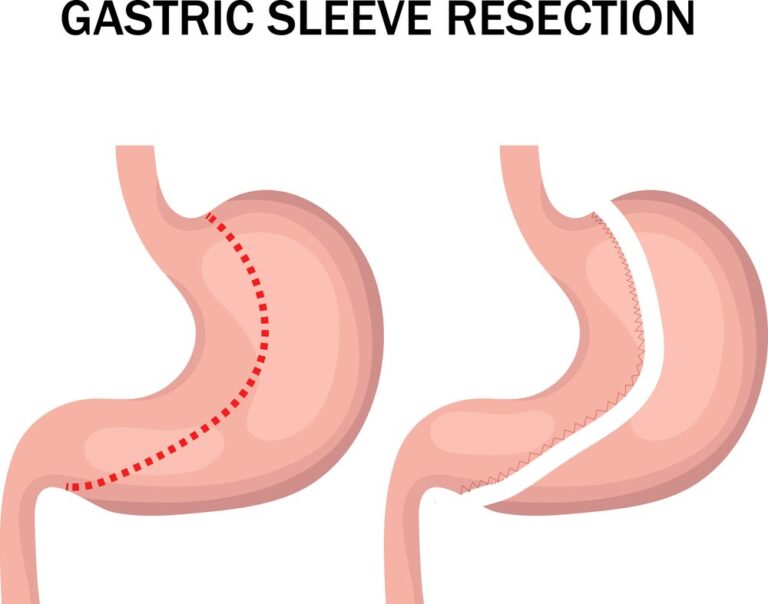Gastric sleeve surgery, also known as sleeve gastrectomy, is commonly performed on individuals with a high body mass index (BMI) to achieve significant weight loss and improve obesity-related health conditions. However, gastric sleeve surgery can also be performed on individuals with a low BMI who struggle with certain health issues. Here is what you can expect before and after “Low BMI gastric sleeve before and after” gastric sleeve surgery:
Before Low BMI Gastric Sleeve Surgery:
Before undergoing low BMI gastric sleeve surgery, you will undergo a thorough evaluation with a healthcare provider specializing in bariatric surgery. This evaluation will include medical assessments, discussions about your health history and weight loss goals, and a comprehensive review of potential benefits and risks associated with the surgery. Your healthcare provider will determine if you meet the criteria for low BMI gastric sleeve surgery based on your individual circumstances.
Surgery and Immediate Recovery:
The surgical procedure for low BMI gastric sleeve surgery is similar to the standard gastric sleeve surgery. It involves removing a portion of the stomach to reduce its size and limit the amount of food that can be consumed. The surgery is typically performed laparoscopically, resulting in smaller incisions and faster recovery times. After the surgery, you will spend a short period in the hospital for monitoring and recovery, similar to individuals with higher BMI.

Pre-Surgery Preparations for Low BMI Patients
If you are a low BMI patient considering gastric sleeve surgery, there are several important pre-surgery preparations to ensure a safe and successful procedure. Here are some key steps to take before undergoing low BMI gastric sleeve surgery:
| Pre-Surgery Preparations for Low BMI Patients |
|---|
| 1. Consultation with a Bariatric Surgeon |
| 2. Medical Evaluation |
| 3. Nutritional Assessment |
| 4. Psychological Evaluation |
| 5. Pre-Surgery Diet and Lifestyle Modifications |
| 6. Quit Smoking and Limit Alcohol Consumption |
| 7. Establish a Support System |
| 8. Understand the Risks and Benefits |
Get a $1000 Off on Gastric Sleeve in Miami
Setting Realistic Expectations: Weight Loss Goals for Low BMI Patients
For low BMI patients undergoing gastric sleeve surgery, it’s important to set realistic weight loss goals based on individual circumstances. Here are some considerations when setting weight loss expectations:
1. Initial Weight and Body Composition: Low BMI patients typically have less excess weight to lose compared to individuals with higher BMIs. As a result, the total weight loss may be lower in absolute numbers.
2. Percentage of Excess Weight Loss (EWL): A common measure of weight loss success is the percentage of excess weight lost. Low BMI patients can aim for a percentage of EWL similar to those with higher BMIs, typically ranging from 50% to 70%. Your healthcare provider can provide more specific guidance based on your individual situation.
3. Health Improvements and Quality of Life: Weight loss can lead to improvements in obesity-related health conditions, such as type 2 diabetes, high blood pressure, and sleep apnea. Focus on the positive health outcomes and improved quality of life that can result from achieving a healthier weight, rather than solely on the number on the scale.
4. Rate of Weight Loss: Low BMI patients may experience a slower rate of weight loss compared to those with higher BMIs. This is because their bodies may have less excess weight to lose and a lower metabolic rate. Aiming for a steady and sustainable weight loss of 1-2 pounds per week is generally realistic.
5. Individual Variations: Each person’s weight loss journey is unique, and individual factors such as metabolism, adherence to dietary guidelines, and activity level can influence weight loss outcomes. Avoid comparing your progress to others and focus on your own personal goals and achievements.
6. Non-Scale Victories: Weight loss is not solely determined by the number on the scale. Celebrate non-scale victories, such as improvements in energy levels, clothing fit, physical fitness, and overall well-being. These achievements can be equally, if not more, important indicators of success.
It’s important to discuss your weight loss goals and expectations with your healthcare provider.
After Gastric Sleeve Surgery: Changes and Progress
After undergoing gastric sleeve surgery, significant changes and progress can occur as you embark on your weight loss journey. Here are some key areas where you may experience changes and progress after gastric sleeve surgery:
| After Gastric Sleeve Surgery: Changes and Progress |
|---|
| 1. Weight Loss |
| 2. Health Improvements |
| 3. Energy and Mobility |
| 4. Dietary Changes |
| 5. Emotional Well-being |
| 6. Lifestyle Changes |
| 7. Ongoing Support and Follow-up |
Gastric Sleeve Surgery for Low BMI Patients: Benefits and Risks
Here are the benefits and risks associated with gastric sleeve surgery for low BMI patients:
| Benefits | Risks |
|---|---|
| Significant weight loss | Surgical risks |
| Health improvements | Complications |
| Improved quality of life | Adjustment period |
| Long-term weight management | Psychological considerations |
| Long-term commitment |
It is important for low BMI patients considering gastric sleeve surgery to have a thorough evaluation and consultation with a healthcare provider specializing in bariatric surgery to assess individual circumstances and make an informed decision.
Weight Loss Progress: What to Expect with a Low BMI
If you have a low body mass index (BMI) and are considering weight loss, it’s important to set realistic expectations for your weight loss progress. Here’s what you can generally expect when pursuing weight loss with a low BMI:
- 1. Slower Initial Weight Loss: Individuals with a low BMI typically have less excess weight to lose compared to those with higher BMIs. As a result, weight loss progress may initially be slower compared to individuals with significant excess weight.
- 2. Gradual and Steady Weight Loss: While the rate of weight loss may be slower, a steady and gradual weight loss is considered healthier and more sustainable. Aim for a weight loss of 1-2 pounds per week, which is generally safe and achievable.
- 3. Non-Linear Progress: Weight loss progress may not follow a linear pattern. There may be periods of rapid weight loss, plateaus, and occasional fluctuations. It’s important to stay consistent with healthy habits and not get discouraged by temporary stalls in weight loss.
- 4. Body Composition Changes: Even if the scale doesn’t show significant weight loss, you may still experience improvements in body composition. This means that you may be losing fat while gaining or maintaining muscle mass. Focus on body measurements, changes in clothing size, and overall improvements in body composition rather than solely relying on the number on the scale.
- 5. Improved Health Markers: Weight loss, even in individuals with a low BMI, can lead to improvements in health markers such as blood pressure, cholesterol levels, and blood sugar control. These improvements are important for overall health and well-being, regardless of the scale numbers.
- 6. Long-Term Success: While weight loss may be slower, individuals with a low BMI have a higher chance of long-term success in maintaining their weight loss. Focus on adopting sustainable lifestyle changes, such as a healthy diet and regular physical activity, to support long-term weight management.

Remember, weight loss progress is highly individualized and can vary depending on factors such as genetics, metabolism, adherence to healthy habits, and overall health. It’s important to consult with a healthcare professional or a registered dietitian who can provide personalized guidance and support throughout your weight loss journey. Celebrate every achievement, no matter how small, and stay committed to your long-term health and well-being.
Inspiring Before and After Stories from Low BMI Patients
Low BMI patients who have undergone weight loss journeys can provide inspiration and motivation for others facing similar challenges. Here are a few inspiring before and after stories from low BMI patients who have successfully achieved their weight loss goals:
- Dietary Changes in the First 3 Months After Gastric Sleeve Surgery: This text discusses the dietary changes necessary during the initial three months post-surgery, including transitioning through diet phases, consuming small frequent meals, prioritizing protein intake, staying hydrated, avoiding problematic foods, practicing slow and mindful eating, and taking vitamin and mineral supplements.
- Benefits and Risks of Gastric Sleeve Surgery for Low BMI Patients: This text highlights the benefits of gastric sleeve surgery for low BMI patients, such as weight loss, health improvements, improved quality of life, and long-term weight management. It also mentions the risks associated with the surgery, including surgical risks, potential complications, adjustment period, psychological considerations, and the need for long-term commitment.
- Weight Loss Progress with a Low BMI: This text explains what to expect in terms of weight loss progress for individuals with a low BMI, including slower initial weight loss, gradual and steady weight loss, non-linear progress, changes in body composition, improved health markers, and long-term success with sustained lifestyle changes.
- Inspiring Before and After Stories from Low BMI Patients: This text features inspiring stories of individuals with a low BMI who successfully achieved their weight loss goals. The stories highlight their transformations, improvements in health, increased confidence, and positive lifestyle changes.






